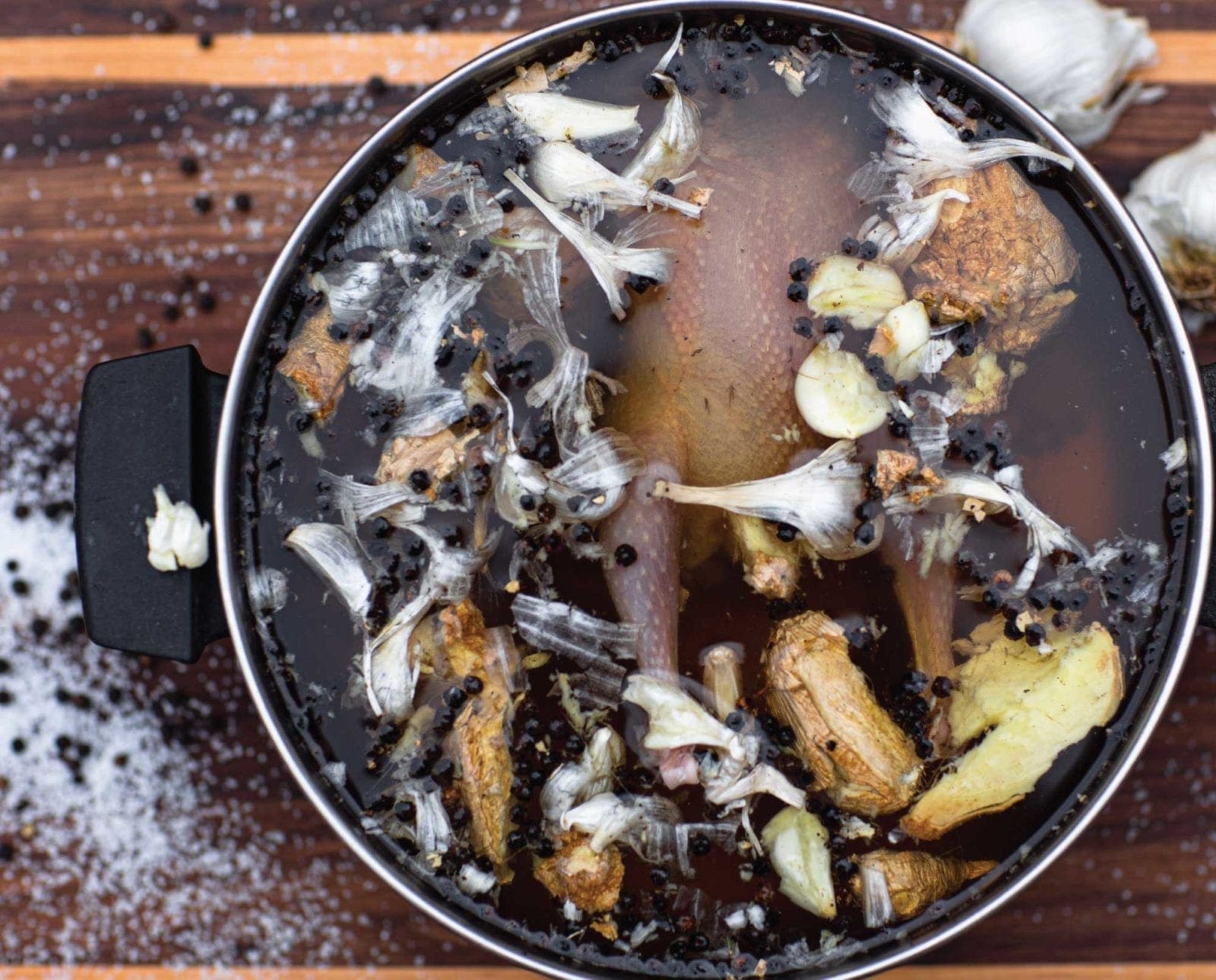Home » Small Game Cooking » Brining Game Birds for Grilling
Brining Game Birds for Grilling

Jack Hennessy grew up in the South Suburbs of Chicago…
Want to learn how to properly brine those game birds for more moist meat?
Between the spring and the early fall this year, our family has put a lot of chukar in the freezer while training our 1-year-old Wirehaired Vizsla, Dudley. Anyone who has cooked chukar knows the meat can dry out quickly but here I want to present some techniques that not only apply to a great-tasting chukar, but upland birds in general.
Brining upland game: Making it moist
First off: brining. I brine all the birds I shoot. Brining does a few key things: it sucks out residual blood, leaving you with a nice clean piece of meat. The salt in the brine binds to muscle fibers and helps retain moisture while cooking. Lastly, a good brine imbues the bird with flavor.
The brine recipe in this article is one I employ for everything from quail to Canada goose. I may add a few extra things here and there (coriander seeds or sliced jalapeños, for example), but the base brine always remains the same. To ensure smaller birds don’t become overly salty, I vary brine times based on the size of a bird.
Quail, grouse, chukar, etc.: 6-8 hours
Pheasant, mallards, etc.: 8-12 hours
Larger cuts from birds like turkeys or Canada goose: 18-24 hours
Always make certain to thoroughly rinse off the meat upon removing from the brine.
Brine ingredients for upland game
1 gallon cold water
1/2 cup kosher salt
1/2 cup white sugar
1/2 cup whole black peppercorns
1 cup fresh garlic, smashed
8 ounces (1/2 pound) fresh ginger, smashed
Steps to brining and grilling
- In a large pot, stir all brine ingredients until sugar and salt is dissolved.
- Add thawed birds and allow to brine for 6-8 hours.
- Upon removing birds from brine, THOROUGHLY rinse all parts under cold water then pat dry with paper towels and place in fridge, skin side up, with plenty of room and ventilation so skin can dry.
- Heat grill or skillet to 400 degrees Fahrenheit. Make sure grill is clean, lightly oiled and hot. Place birds skin-side down and press so all portions of bird are in contact with the grill.
- Sear until golden brown then flip, doing the same on the other side.
- Finish in oven or covered grill at 325 for 15-20 minutes, until legs are tender.
Before grilling, always make sure the bird’s skin is completely dry, as wet skin leads to potentially mushy exterior or, at very least, a less-than-perfect sear.
Finally, make sure your grill is clean. Yes, you can wash or use a grill scraper, but when the grill is hot, before cooking, you should take a rag oiled with sunflower or olive oil (any food-safe oil really) and run in over grill until clean. Leave a light coating behind so food doesn’t stick.
Enjoy! Reach out to me on Instagram (@WildGameJack) with any questions or comments.
Jack Hennessy grew up in the South Suburbs of Chicago and didn't start hunting until he attended graduate school in Spokane, Washington, at the age of 26. Hennessy began work in professional kitchens in high school but didn't start writing wild game recipes until he joined the Spokesman-Review in 2014. Since then, his recipes have appeared with Petersen's Hunting, Backcountry Journal, Gun Dog Magazine, among many others. He now lives with his Wirehaired Vizsla, Dudley, in Wichita, Kansas.




Most everyone I hunt with doesn’t take the time to pluck birds but skins them for the sake of time yet the majority of cooking articles for wild birds start with a bird with skin on. Where are the articles for the typical bird hunter’s birds?
The typical bird hunter should pluck their birds. Its a damn shame to put time and money into killing a bird and then not spend the bit of extra time to pluck. You have days to find time to pluck if stored right. Every recipe is then available to try… If you want bland chickens go buy skinless chicken.
Hello Jason, I’m new to bird/duck hunting this year and I agree with your sentiment, why spend so much money to get behind birds just to waste the bird? Would you share with me your method of plucking and how much time I have to complete this task before I need to freeze them?
Thanks, look forward to hearing from you.
I have never found plucking takes only a “bit” of time. For me a single pheasant takes around 20 minutes, interestingly about the same for a chukar and only slightly less for quail.
Brining lends itself well to skinless birds in my experience. In fact its a must for grilling! I use a simple brine of 1/4cup sugar and 1/4 cup salt in 6 cups of water for an hour.
I will try the brine in this article as it sounds good.
New hunter here – do you only brine if you’re bird is whole? I pluck, but still often end up with skinless pieces (ie goose breast) and broken down birds.
I brine all birds for the most part, even when broken down. Goose is a great example, so is wild turkey. I’ll brine a large tom breast for 18-24 hours, then a Canada goose breast for likely for 12-16 hours, maybe 18 hours on a leg. If I’m brining a couple pheasant breasts, I likely don’t brine for more than 6 hours. The same rule applies to broken-down bird cuts: Vary brining time based on size of what you’re brining.
Would you adjust the length of time for brining is you knew the bird was older vs a young bird?
Excellent question. You certainly can but the flip side of that is a potentially saltier piece of meat. Yes, brine will denature muscles, but grow saltier. Typically, ideally speaking, you’d want to age those older birds for several days then either skin or pluck and brine according to these timelines. Aging birds is a whole other topic, but definitely worth looking into too.
Newbie here… do u brine at room temp or in a refrigerator? covered or uncovered… appreciate all of ur info & time to share it! .. this may sound crazy, but would it (if allowed ??) to cage wild turkeys if able to catch & corn feed awhile to fatten up? Reason for asking is… the darn turks got in my small decorative pond & found a dinner hole eating all my fish! i never would have believed if i hadn’t seen! Well of course they keep returning to their favorite restaurant now(Lol) So i thought about putting a net over the pond, but any turkeys will likely get caught in the tent! So would i have to terminate them or let them go? or could i coup them for a little while to fatten up to join us for Thanksgiving?? … Thank you again! y’all are awesome!! Brenn
Let’s assume I have a plucked bird that I want to freeze. Do you brine then freeze, or freeze and brine after you thaw it, just before cooking? Thanks!
Excellent question. My experience has been you lose the effects of a brine after freezing. However, a quick, simple saltwater brine ahead of freezing helps draw out blood and put away cleaner meat. So if you are dealing with a slightly bloody product, soaking in salt water, then rinsing, before freezing might help. But if you want that moisture retention and added flavor when cooking, brine upon thawing.